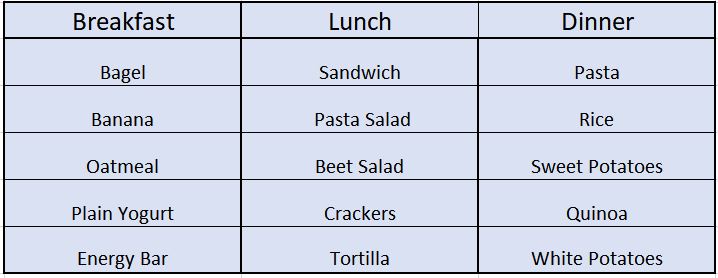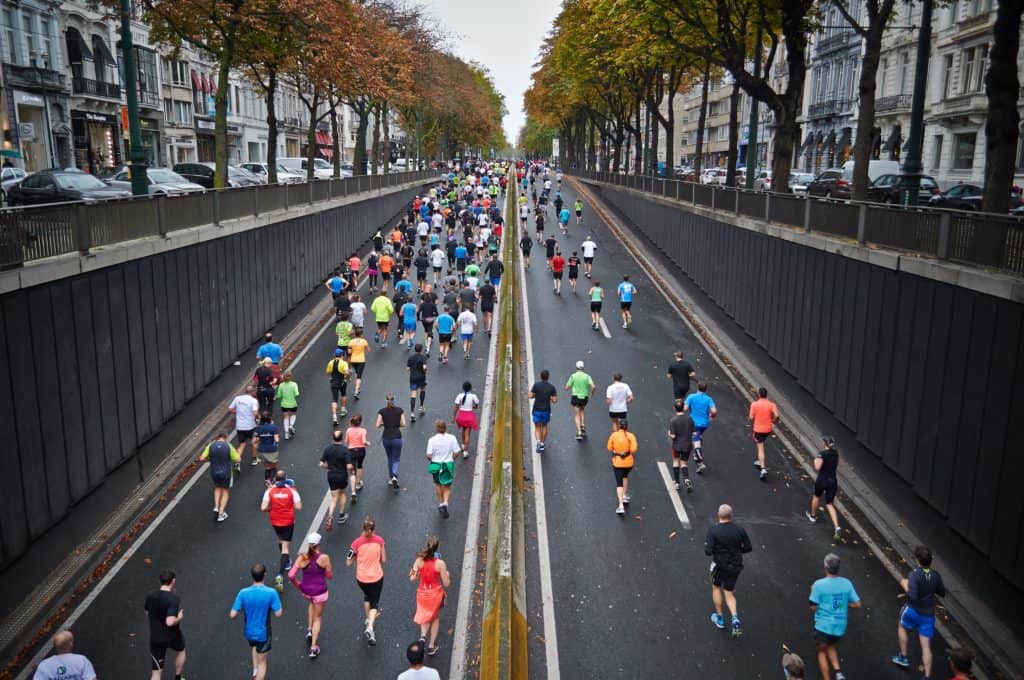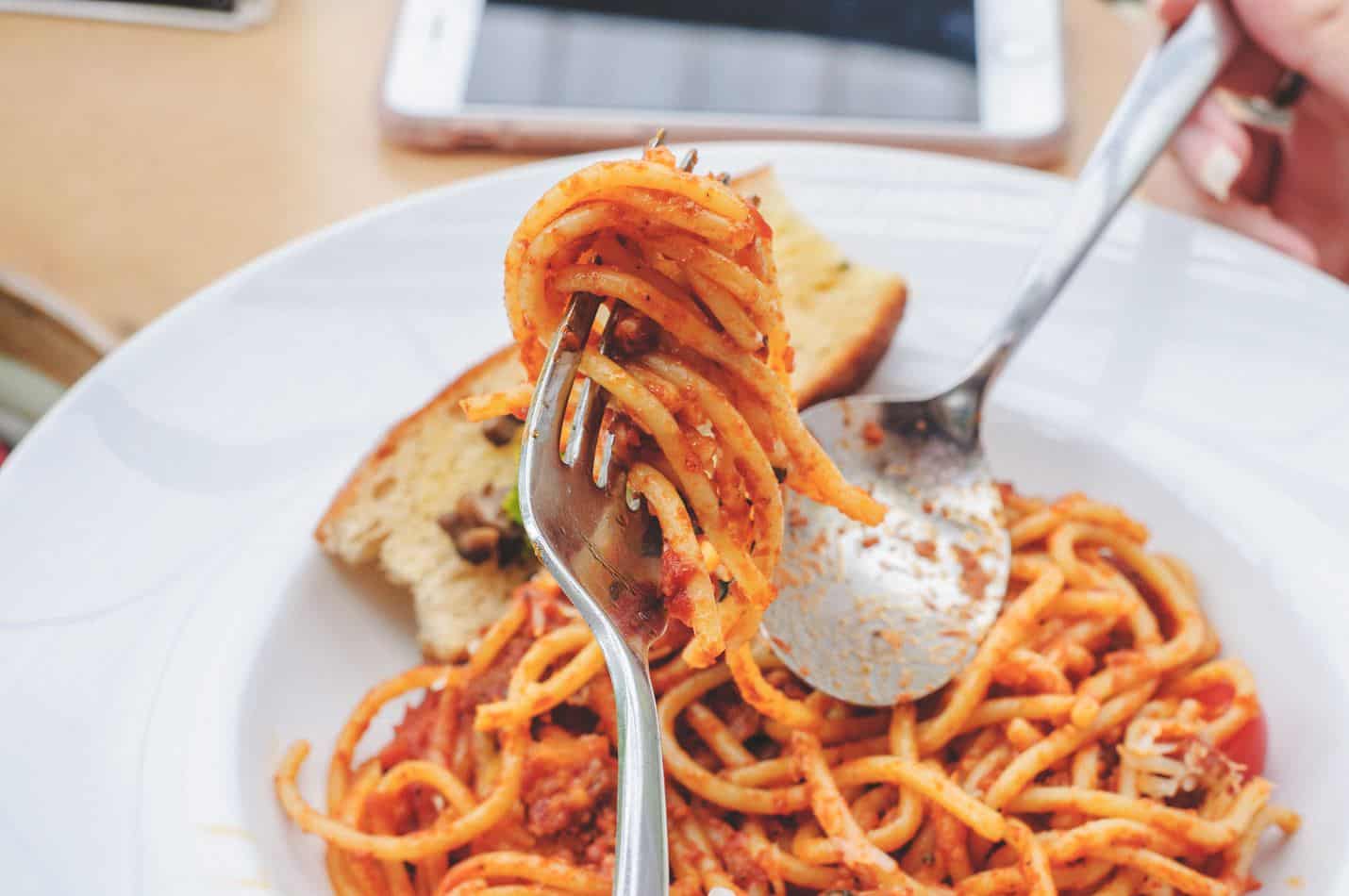I got into running because of my dad. We’ve run many races together and they will always be some of my favorite memories. What I also remember about my dad and all those races was how he always wanted to “carbo-load” the night before each of them. I certainly loved a good pasta, so who was I to argue? In fact, many races, including marathons, had a spaghetti dinner you could sign up for as part of the race package. Nutrition is a huge part of running well in marathons, so I wanted to find out more about why marathon runners, especially, need to carbo-load and how it’s most effectively done.
So, why do marathon runners carbo-load? Marathon runners carbo-load, or eat extra carbohydrates, because it gives them enough energy to sustain their endurance through long runs. Since running uses energy from glycogen stores, eating carbohydrates leading up to a long run allows the body to tap into this preferred energy source.
Science backs up the idea that carbohydrates are a necessary component of an endurance runner’s nutrition. Here we’ll help you understand why that is as well as if downing a giant bowl of pasta with a baguette on the side is really what you should be eating.
Evidence for Carbo-Loading in Marathon Runners
According to Webster’s Dictionary, the first use of the term “carbo-loading” was not until 1983, though marathon runners had been eating carbohydrate-heavy diets for much longer. They ate this way for a long time not really knowing why it made them better runners.
It wasn’t until the late 1960s that they got the answer. According to this article from the Marathon Charity Cooperation, the glycogen connection is attributed to physiologist Gunvar Ahlborg. He discovered that the reason carbohydrates were so necessary for top endurance performance was due to the glycogen stores they allowed for within the muscles and the liver when you ate them. With glycogen stores almost entirely depleted by around 2,000 Calories, you can see why a marathon runner would want to maximize their glycogen stores for race day. The body can turn carbohydrates into glucose, and those are stored within the muscles and liver as glycogen. Therefore, carbohydrates are a necessary diet component for runners.
He suggested that to gain optimal glycogen stores an athlete first needed to deplete them through eating very little carbohydrates. Then, a diet made up of 90% of carbohydrates would be consumed by the runner 3-4 days before their race. He created a protocol that was used on trained athletes and his hypothesis was confirmed. However, this was not deemed to be the healthiest way to prepare athletes for their big races. Somewhere along the way, someone coined the term “carbo-loading” referring to the process…and it certainly seems to fit.
So if severe glycogen depletion isn’t the way to go, but we know carbs are necessary for endurance running, it sounds like we need to meet somewhere in the middle.

Carbo-load for Marathon Success
We’ve established that some form of carbo-loading is necessary for marathon runners. Now we need to determine the best course of action in how to consume those carbohydrates. Some questions you probably have that we’ll answer include:
- How many days before my marathon should I begin carbo-loading?
- How many carbs do I need?
- In what form should I eat them?
The goal here is to give you the knowledge you need to create a balanced carbo-loading plan that optimizes your nutrition for race day. Of course, every runner will be different so these will be guidelines. Utilizing these techniques prior to long runs will allow you to play around with what works best for your body. That way, by the time race day rolls around you’ll know exactly how you plan to eat.
Starting your Carbo-load
Glycogen stores will build up over several meals, so don’t plan on your one dinner the night before giving you all the carbo-loading you need. 2-4 days is the recommended timeframe to begin the process. More than likely, you are someone who already eats some carbs in your daily life. Cutting down on them somewhat before the 2-4 day period can help the glycogen stores build up once the carbo-loading begins, but I wouldn’t worry too much about it. The average runner will benefit from upping their intake somewhat in those few days leading up to their race. Here we’re focusing on a milder, yet effective, approach.* In these days, your activity should also be very light. Remember that your goal is to store your fuel, so don’t use it up too early by being too active before your marathon.
Percent of Carbohydrates
During this time, you will cut back the amount of fat you’re eating and increase your carbohydrate intake. Aim for 70-80%. A few simple adjustments to your daily diet will make this possible without having to spend too much time focusing on exact numbers. The Mayo Clinic suggests that marathon runners may need as much as 12 grams of carbohydrate per kilogram of body weight, but I personally find figuring this out too overwhelming. I want to be relaxing in my days before my marathon, not looking at every single gram of carb I’m consuming. But for those seeking perfection, there you go.
The Right Carbs to Eat
This is the part you’ve been waiting for. Where I tell you what it is you’ll want to eat in those few days before your marathon. If you’re like me, someone who leans towards a lower-carb lifestyle, you probably can’t wait for the carbo-loading indulgence to begin. Let’s look at some options for what you could eat at each meal time:

Obviously, you won’t want to eat all of these at each meal. Choose 1 or 2 and then pair it with lean meat (chicken and fish are great options) and vegetables for a well-rounded meal. Dried fruit makes an excellent snack.
As far as choosing whole grains over their white counterparts, there is actually some debate about which is the better choice. Even though whole grains are generally slower to digest and therefore “healthier” this may not be the route you want to go prior to race day. If whole grains are what you normally eat, carbo-loading on them shouldn’t be a problem. On the other hand, if you aren’t used to eating a lot of whole grains, the 2-4 days leading up to the race is not the time to start. I personally prefer white grains.
Carbo-loading Mistakes
Carbo-loading is a common practice among marathon runners. And since every person’s body is different, there won’t be one perfect way to do it. As suggested previously, you’ll want to try out your carbo-loading strategy prior to race day to see how it makes you feel. You’re looking for more energy and stamina, not a feeling of fullness you just can’t shake. We’ve given you some great pointers to get started on your carbo-loading process, but here are a few mistakes we want to ensure you don’t make.
- Consuming whole grains when your body hasn’t had time to adjust to them. We suggest white grains, especially if you’re new to carbo-loading. They will still help you build up those glycogen stores you need without the possibility of stomach upset. Since whole grains digest more slowly, eating too many in a short amount of time can make you feel lethargic, bloated, and hunting for a bathroom.
- Eating lots of fruit. Yes, fruit is usually an excellent source of carbohydrates which is what we’re aiming for here. But most of them are high in fiber. This is not a good combination for race day, which can lead to stomach discomfort similar to eating whole grains. You don’t need to erase fruit altogether, but keep it in check.
- Eating the wrong amount of carbs. Just because you’re carbo-loading, it doesn’t mean that you should overeat. Remember that you should be lowering your fat intake while increasing your carbohydrate intake. Remember when we were wondering if eating a giant bowl of pasta with bread on the side was a good idea? Unless this is the number of Calories you would consume normally, the answer is probably no. On the flip side, if you don’t eat enough carbohydrates, you didn’t carbo-load. This means your energy on race day could suffer.

Ready for Race Day
Just like anything with marathon training, plan ahead to make carbo-loading work in your favor. You want to make it to the starting line feeling energized and ready to run. (And don’t worry if you’re a couple of pounds heavier, that just means you have the energy you need.) If you fueled properly in the few days leading up to your race, your body will have the glycogen stores it needs to push through when it counts and cross that finish line at 26.2.
*If you do decide you want to try a stricter plan such as Ahlborg’s, it would probably be best to do under the direction of a nutritionist or coach.







